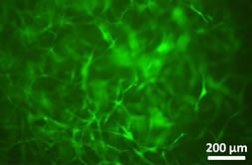 Viability image of live human stem cells (green) seeded on a nano-structured scaffold.
Viability image of live human stem cells (green) seeded on a nano-structured scaffold.
There is clear scope for biomaterials and tissue engineering as a future treatment for osteoarthritis.
Advanced biomaterials can provide physical support for engineered tissues as well as powerful topographical and chemical cues to guide cells seeded in the tissue. Nanostructured polymer and peptide scaffolds and injectable gels can support cartilage regeneration, while composite materials can support osteochondral regeneration. We will create tissue-engineered constructs and translate them from in vitro to in vivo and develop cell therapy combined with biomaterials.
The aim of this area is to engineer minimally-invasively implantable nanostructured material scaffolds and cells for regeneration of tissues damaged by osteoarthritis.
Research team
Professor Molly Stevens
Objective leader
Molly Stevens is currently Professor of Biomedical Materials and Regenerative Medicine and the Research Director for Biomedical Material Sciences in the Institute of Biomedical Engineering read more...
Doctor Helene Autefage
Source: www3.imperial.ac.uk
Catalyst Could Jump-Start E-Cars
by 56andfixed
June 4, 2013
Los Alamos National Laboratory scientists have designed a new type of nanostructured-carbon-based catalyst that could pave the way for reliable, economical next-generation batteries and alkaline fuel cells, providing for practical use of wind- and solar-powered electricity, as well as enhanced hybrid electric vehicles.
In a paper appearing recently in Nature Communications, Los Alamos researchers Hoon T. Chung, Piotr Zelenay and Jong H. Won, the latter now at the Korea Basic Science Institute, describe a new type of nitrogen-doped carbon-nanotube catalyst
Depleted Uranium and our troops and all those
by living-in-the-ME
Oct. 2006: President George W. Bush signed the Department of Defense Authorization legislation. The House amendment was authored and introduced by Rep. Jim McDermott (D-Wa.) ordering a comprehensive study - with a report due in one year - on possible adverse health effects on U.S. soldiers from the U.S. military's use of DU - Depleted Uranium. The Senate companion bill was backed by Joe Lieberman of Conn., a democrat at the time. (McDermott's Web site: )
Feb. 6, 2007: The New York newspaper, The Post Chronicle, reported that U
Nanotubes Increase Solar PV Conductivity 100 Million-Fold — Sourceable
Carbon-based nanostructures are already being used as materials in solar cells with increasing frequency, yet their ability to enhance electrical performance has thus far been hampered by limited ability to assemble orderly networks using the materials.

|
Biomimetics: Advancing Nanobiomaterials and Tissue Engineering
Book (Wiley-Scrivener)
|

|
Biologically Responsive Biomaterials for Tissue Engineering (Springer Series in Biomaterials Science and Engineering)
Book (Springer)
|
 Viability image of live human stem cells (green) seeded on a nano-structured scaffold.
Viability image of live human stem cells (green) seeded on a nano-structured scaffold.






